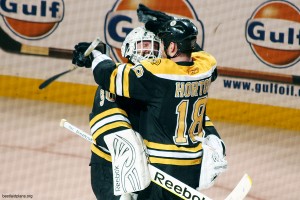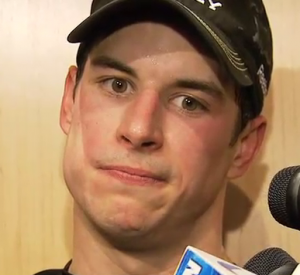Jim Neveau, NHL Correspondent
Under the reign of Commissioner Gary Bettman, the NHL has become an easy target for those around the hockey world to make fun of, and perhaps the greatest opportunity for those folks to poke a stick at the caged beast has been when it makes decisions regarding discipline. Under the reign of discipline czar Colin Campbell, much has been made of his supposed “Wheel of Justice” and the crazy lengths to which it would seem that he would go to avoid following established precedent, and to instead make numbers up as he went along. This provided easy comedic fodder, and for years the league followed this same pattern of staining their shield with inconsistency.
In more recent times, coincidentally or not after the departure of Campbell from day-to-day discipline decisions, the league has begun to actually make some strides forward in the way it hands out its punishments. While they certainly dropped the ball in the Alex Burrows mess (who on Earth would think there was no indisputable evidence that he bit Patrice Bergeron in Game 1 of this series?), they made up for it in a big way with their approach to the Aaron Rome hit on Nathan Horton, suspending him for the rest of the series and silencing a lot of critics with the way they came to, and defended, their decision.

While most in the hockey world were focusing on the physics of the collision (“did he lead with an elbow?” “Was the primary point of contact his head?” “Was it a blindside hit?”), interim czar Mike Murphy took a different tact to the proceedings. Ruling that the hit had come much later than necessary, and after conferring with several other people, including former disciplinary master Brian Burke, Murphy elected to suspend Rome for the remainder of the series in a decision that shocked a lot of people around the game.
Sure, there was plenty of belly-aching from the Vancouver fanbase about Burke being consulted about the suspension, and there is a certain degree of logic to that. After all, Burke is the current General Manager of an NHL club, and he had also been fired by the very organization that was being punished. While that is a legitimate concern (contrary to what a lot of folks outside of British Columbia would have you believe), the main point here is that Murphy didn’t want his to be the only opinion that counted in such a delicate manner. In deciding this, he went with his gut, which told him to consult with a guy who has been in this boat before. This move may have infuriated some who saw it as an opportunity for Burke to strike revenge, but the decision was not his alone, and asking for guidance in what could be a moment that sets precedent was a shrewd and well-informed move on the part of Murphy.
The focus on the lateness of the hit was a refreshing change of pace as well. The “blindside” nature of the hit was truly too close to call, even on slow-motion replay, and Murphy certainly had his work cut out for him in deciding whether or not the hit violated Rule 48. In the end, he decided that the hit did not fall under the jurisdiction of that rule, but he also decided that the hit was so blatantly late that he needed to send a message to Rome and the Canucks. With the series becoming more physical by the second, he more than likely felt that he needed to head that train off at the pass, so suspending Rome for the remainder of it was probably the only option he felt he had.
While consulting with others about potential suspensions seems to be a novel concept, the NHL is also looking at tweaking Rule 48, which could be another positive sign of progress in the battle against devastating head injuries. On Wednesday, it was announced that the league’s GM’s, who are meeting in Boston, had recommended that the league remove language in Rule 48 mentioning hits being from the “blindside”. The wording of this rule provided a type of loophole that could allow players to escape unpunished for malicious hits to the head, so the GM’s felt that by removing it they could make the rule more true to the spirit in which it was conceived.

Now, changing this rule would not ban all hits to the head, as some have advocated for, but perhaps new discipline chief Brendan Shanahan put it best at a press conference that followed the meeting when he said:
“There is a crucial aspect of the game where a player has his head down, and you can check him legally. We want to focus on the hits that are more dangerous, where the player is defenseless, where a player has no reasonable chance or expectation to defend themselves.”
The league is in a difficult position when it comes to the issue of headshots as a whole. A league that used to be thrilled with the exploits of Scott Stevens (who can forget when he demolished guys like Eric Lindros and Paul Kariya?) is now in a position where perhaps its brightest star, Sidney Crosby, is dealing with the after-effects of a hit to the head. Overreacting and removing headshots from the game altogether may seem like a good idea, but there always has to be some give in these types of rules, and banning them altogether would be a difficult thing for the league to effectively manage. How can you tell if a player deliberately hit someone in the head, or if it was an unfortunate accident? The amount of judgment involved in decisions involving discipline for such a rule would certainly invite more ridicule, and the league doesn’t need that additional pressure heaped upon it.
Even with a total ban on headshots off the table, more judgment calls would have to be made if the Board of Governors approves the removal of the “blindside” element to Rule 48. This would fall squarely on Shanahan’s shoulders, but judging by his comments about the proceedings today, those decisions seem to be in the right hands. He has a genuine concern about the affect of headshots on the game, and he’ll need that in order to render appropriate judgments when the job becomes his next season. Needless to say, it is a tremendous challenge that he is undertaking, but he has the right mentality going into it.
While the league has deserved a lot of the criticism it has received for how its handled disciplinary matters, they deserve some praise for the steps they have taken in recent days. They may not have been steps that everyone could agree with, but it has to be said that at least the league is moving in a positive direction. Hopefully next season we will finally see a more coherent strategy for dealing with the miscreants that are a stain on this game, and with a bit of luck, all talk of a “Wheel of Justice” will fade along with Colin Campbell from the scene, and this league will be better off for the departure.